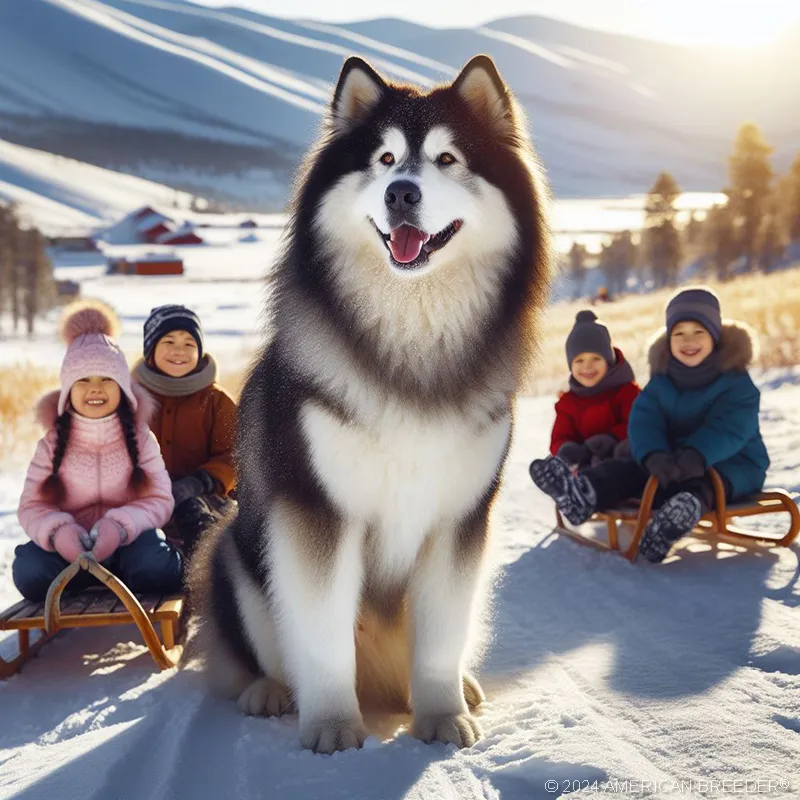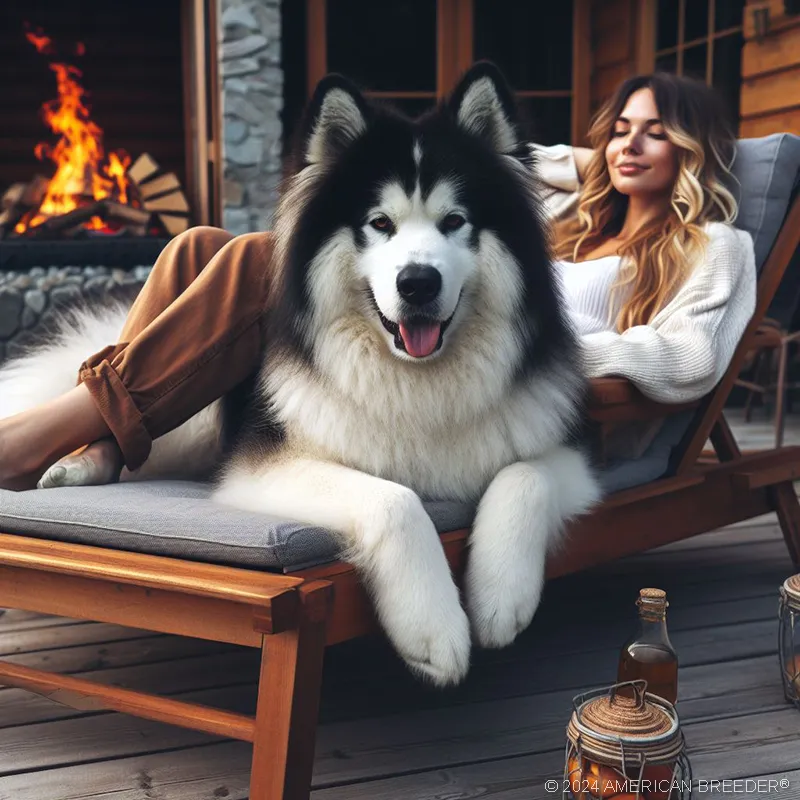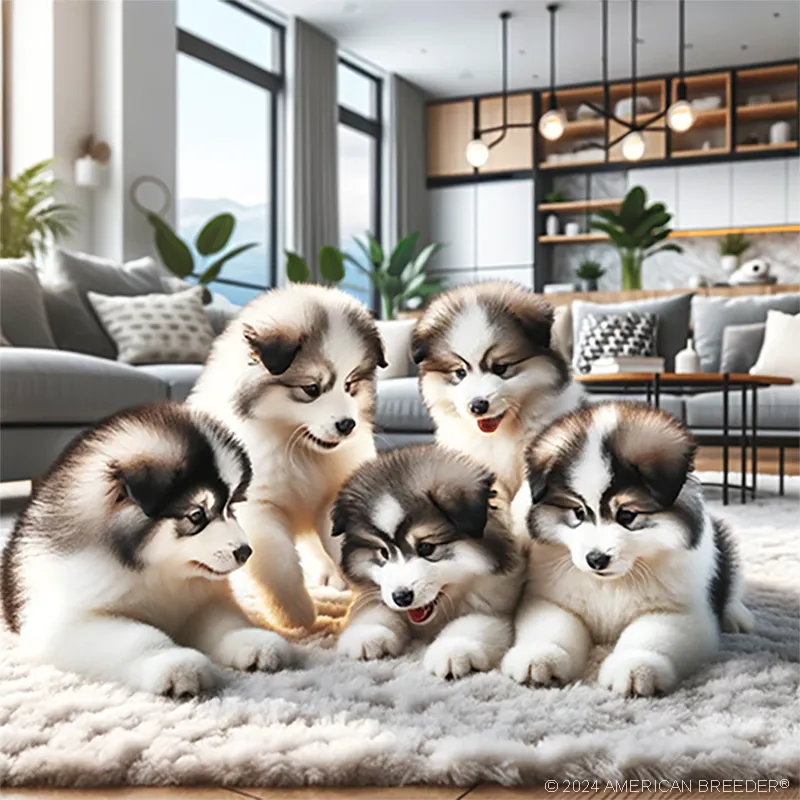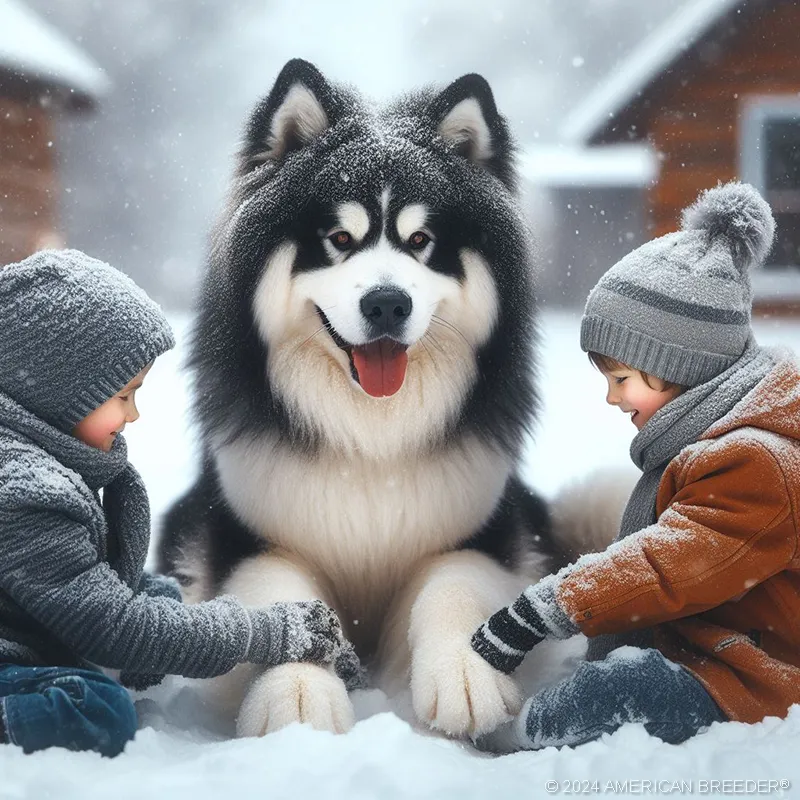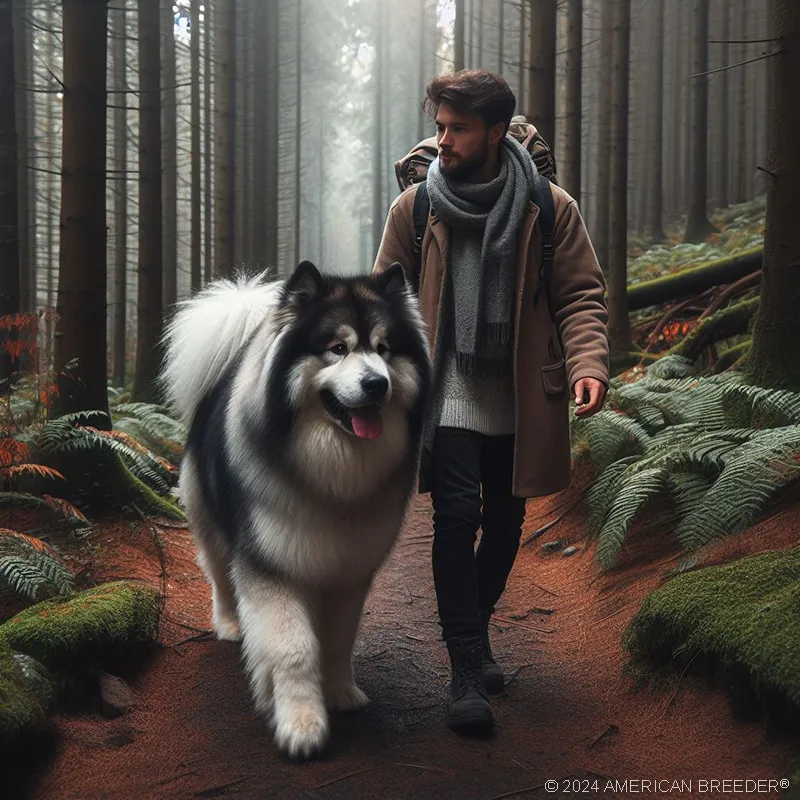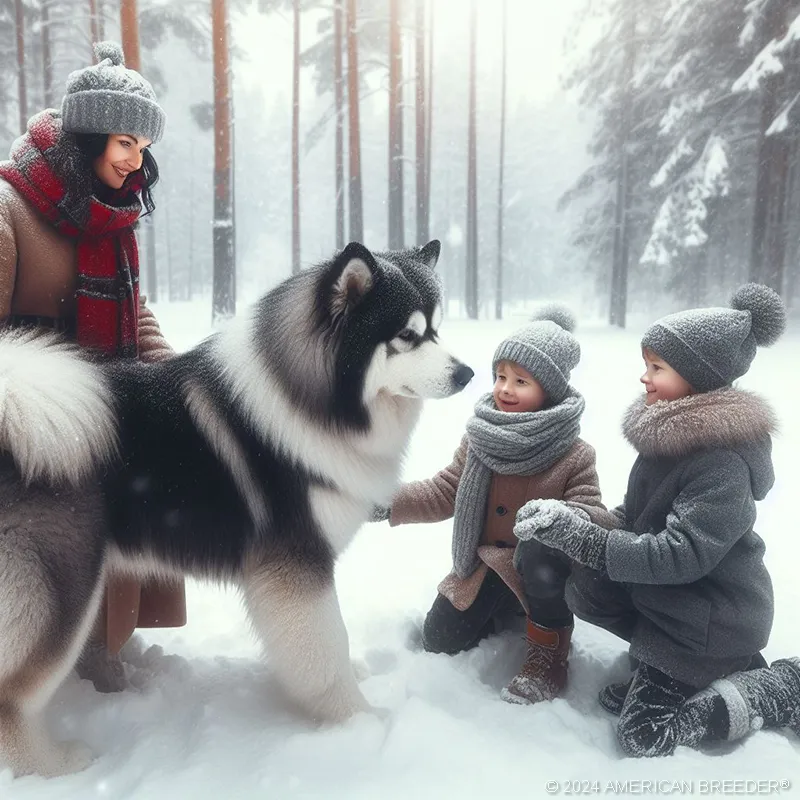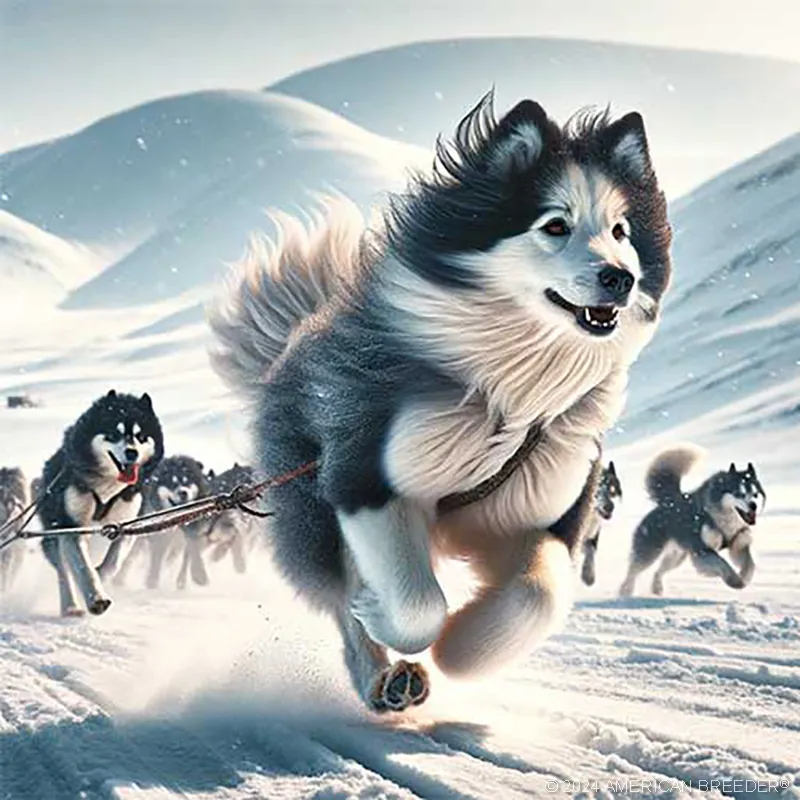The Comprehensive Guide to the Yakutian Laika Dog
The Yakutian Laika Dog, a breed as fascinating as its name, embodies a rich tapestry of history, characteristics, and unique traits. In this comprehensive guide, we will delve deep into the world of the Yakutian Laika, uncovering its origins, exploring its temperament, discussing its care requirements, and much more.
Breed Background and History
The Yakutian Laika's roots run deep in the frigid expanses of Siberia, where it was developed by the indigenous Yakut people. This breed's history is closely intertwined with the Yakut culture, where it served as an invaluable companion and working dog for centuries. These dogs played a pivotal role in hunting, herding, and guarding livestock in the harsh Siberian wilderness. They adapted to the extreme climate, becoming resilient, self-reliant, and incredibly hardy.
Appearance and Distinctive Features
The Yakutian Laika is a striking breed with a well-proportioned body and distinctive physical features. They are of medium size, typically standing 21 to 24 inches tall at the shoulder and weighing between 40 to 55 pounds. Their dense double coat, which comes in various colors and patterns, provides insulation against the freezing temperatures of their native land. This breed boasts expressive almond-shaped eyes that convey intelligence and alertness.
One of the most notable features of the Yakutian Laika is its pricked ears, which stand erect and help them detect sounds in their environment. Their tail is often carried in a sickle or curled over the back, giving them an elegant and regal appearance. These physical attributes make them well-suited for the demanding tasks they were bred for.
Temperament and Personality
Yakutian Laikas are renowned for their exceptional temperament and unique personality traits. They are known to be loyal, affectionate, and deeply attached to their human families. Their strong sense of loyalty can sometimes translate into protectiveness, making them excellent watchdogs. Despite their protective instincts, they are not inherently aggressive and can coexist peacefully with other pets when properly socialized.
In terms of energy levels, Yakutian Laikas are highly active and thrive on regular exercise and mental stimulation. Their love for the outdoors and exploration is matched only by their intelligence, which makes them quick learners. However, they do have a strong independent streak, a characteristic they developed to survive in the wild. This independence can sometimes manifest as stubbornness, but with patient and consistent training, they can be obedient and responsive companions.
Health and Care
Proper care and maintenance are essential for the health and well-being of the Yakutian Laika. Like all breeds, they are prone to certain health issues, including hip dysplasia and certain hereditary conditions. Regular veterinary check-ups, a balanced diet, and a suitable exercise regimen are crucial components of their care. Their double coat requires regular brushing to prevent matting and reduce shedding.
In terms of nutrition, it's vital to provide them with a high-quality dog food that meets their specific needs. Feeding schedules should be consistent, and portion sizes should be monitored to maintain a healthy weight. Additionally, attention to dental health is essential to prevent dental issues.
Socialization and Compatibility
Yakutian Laikas are known for their friendly and sociable nature. They are typically good with children, making them excellent family dogs. However, early socialization is key to ensuring they are well-adjusted around other pets and strangers. They are known to be amiable and can form strong bonds with their human family members.
Training these dogs is a rewarding experience, but it requires patience and consistency. Positive reinforcement methods work best, as they respond well to praise and treats. Their intelligence and quick learning abilities make them suitable for various dog sports and activities, such as agility and obedience.
Suitable Living Arrangements
Yakutian Laikas are adaptable dogs that can thrive in different living arrangements. While they are well-suited to homes with spacious yards where they can roam and explore, they can also adapt to apartment living if they receive sufficient exercise and mental stimulation. They are known to be resilient to cold weather, making them ideal for regions with harsh climates.
For those considering bringing a Yakutian Laika into their home, it's important to provide a safe and secure environment. This includes proper fencing to prevent them from wandering and access to shelter during extreme weather conditions.
Training and Obedience
Training the Yakutian Laika is a rewarding endeavor that requires a positive and consistent approach. Due to their intelligence and independent nature, they may challenge their owners at times. However, with the right training techniques, they can excel in obedience and become well-mannered companions.
Basic obedience training is essential to ensure they respond to commands and behave appropriately in various situations. It's also advisable to engage them in mental stimulation activities to keep their sharp minds engaged. Advanced training can include tasks and skills that tap into their natural instincts, such as scent work and herding exercises.
Exercise and Activity
Yakutian Laikas are a highly active breed that thrives on physical activity. Daily exercise is not just a preference for these dogs; it's a necessity to keep them happy and healthy. Long walks, hikes, and outdoor play sessions are essential to burn off their abundant energy.
In addition to physical exercise, mental stimulation is equally important. Engaging them in puzzle toys, interactive games, and scent-based activities can help keep their minds sharp and prevent boredom. These dogs have a strong drive to work and explore, so providing them with opportunities to do so is crucial.
Financial Planning
Owning a Yakutian Laika comes with financial responsibilities. In addition to the initial cost of acquiring the dog, there are ongoing expenses to consider. These include food, grooming, veterinary care, training, toys, and supplies. It's important to budget for these costs to ensure you can provide the best care for your furry companion.
Consideration should also be given to pet insurance or setting aside funds for unexpected medical expenses. Proper financial planning ensures that you can provide for your Yakutian Laika's needs throughout their life.
Responsible Ownership and Ethical Considerations
Responsible ownership extends beyond meeting your dog's physical needs. It involves making ethical choices, such as adopting from shelters or reputable breeders and avoiding puppy mills. Spaying or neutering your Yakutian Laika, if not intended for breeding, is a responsible decision to help control the pet population.
Commitment and dedication are essential aspects of responsible ownership. Dogs, including Yakutian Laikas, are lifetime companions, and their well-being should always be a top priority.
Legal Responsibilities and Regulations
Understanding the legal responsibilities and regulations related to dog ownership is crucial. This includes licensing requirements, leash laws, vaccination mandates, and other local regulations. Complying with these laws not only ensures the safety of your Yakutian Laika but also fosters positive relationships with your community.
Resources and Support
As a Yakutian Laika owner, it's valuable to have access to resources and support. Local resources, such as veterinarians, trainers, and grooming services, play a crucial role in your dog's well-being. Online communities.
Health Monitoring and Regular Check-ups
Regular health monitoring is essential to ensure the well-being of your Yakutian Laika. Establishing a routine of annual veterinary check-ups is a fundamental part of responsible ownership. During these visits, your veterinarian can assess your dog's overall health, administer necessary vaccinations, and discuss any concerns or preventive measures.
In addition to annual check-ups, it's important to be vigilant for signs of potential health problems. Yakutian Laikas, like all breeds, may develop certain health issues over their lifetime. Being aware of these issues and their early warning signs can help you seek veterinary attention promptly, potentially preventing more serious health problems down the line.
Maintaining a pet health record can be beneficial. This document should include your dog's vaccination history, a schedule for preventive treatments like flea and tick prevention and heartworm prevention, as well as any notes on health concerns or dietary changes. Organizing your dog's medical information in one place simplifies the process of tracking their health.
Socialization for a Well-Adjusted Dog
Socialization is a critical aspect of raising a well-adjusted Yakutian Laika. Early socialization, typically between the ages of 3 to 14 weeks, is crucial. During this period, exposing your dog to various environments, people, animals, and situations can help them develop confidence and reduce fear or anxiety in new situations.
Understanding the concept of the critical socialization window is vital. This window represents a time when puppies are most receptive to new experiences, and positive interactions during this period can have a lasting impact on their behavior. However, socialization efforts should continue throughout your dog's life to maintain their social skills and adaptability.
Effective socialization has numerous benefits, including reducing the likelihood of behavioral problems and anxiety. It can also make your Yakutian Laika more adaptable to different environments and situations, ensuring they are well-behaved and comfortable in a variety of settings.
Traveling and Outings with the Dog
Traveling with your Yakutian Laika can be a rewarding experience, but it requires preparation and consideration of your dog's unique needs. Before embarking on a journey, ensure your dog is comfortable with car rides. Start with short trips and gradually increase the duration to build their confidence.
When traveling, pack essential items such as food, water, bowls, a leash, and any medications your dog may need. Research pet-friendly accommodations and destinations, as not all places are welcoming to dogs. Consider the climate and weather conditions at your destination, as these can impact your dog's comfort and safety.
During outdoor adventures like hiking, make sure your Yakutian Laika is physically prepared for the activity. Bring adequate water, snacks, and rest breaks to keep them energized and hydrated. Keep your dog on a leash in unfamiliar areas, as their independent nature may lead them to explore beyond safe boundaries.
Training for Specialized Roles and Jobs
Yakutian Laikas excel in various specialized roles and jobs due to their intelligence, agility, and strong work ethic. One notable area where they shine is in therapy and service dog roles. These dogs have a calm and friendly demeanor, making them well-suited for providing emotional support and assistance to individuals with disabilities or in therapeutic settings.
Training requirements for working and assistance roles may vary, but a strong foundation in basic obedience is crucial. Certification and qualifications for therapy and service dogs are essential for ensuring they meet the standards required for their roles. Success stories of Yakutian Laikas in specialized roles abound, showcasing their remarkable abilities and positive impact on individuals and communities.
Service dogs, in particular, can greatly enhance the quality of life for people with disabilities, providing assistance with tasks and offering emotional support. The unique combination of intelligence and empathy exhibited by Yakutian Laikas makes them outstanding candidates for these roles, transforming lives in the process.
Fun Facts and Quirks
To truly appreciate the Yakutian Laika, it's worth delving into the delightful and endearing quirks that make this breed special. While they are known for their serious and hardworking nature, they also have a playful side. Many Yakutian Laikas exhibit amusing behaviors and characteristics that endear them to their owners.
One endearing quirk is their vocal nature. Yakutian Laikas are known for their expressive barks and howls, which they often use to communicate their feelings or alert their owners to perceived threats. This vocal nature is a remnant of their heritage as working dogs in Siberia, where their vocalizations were invaluable in herding and hunting.
Another fun fact is their love for the cold. Unlike some breeds that shiver in chilly weather, Yakutian Laikas thrive in subzero temperatures. Their thick double coat and well-insulated paws make them incredibly resilient to cold climates. They are often seen frolicking in the snow, seemingly impervious to the freezing conditions.
Their strong sense of independence can also lead to amusing displays of self-reliance. Yakutian Laikas are resourceful dogs that can figure out solutions to problems on their own. While this independence can present training challenges, it also showcases their intelligence and problem-solving abilities.
Conclusion
In conclusion, the Yakutian Laika Dog is a breed that embodies a captivating blend of history, temperament, and unique characteristics. Their origins as the companions of the Yakut people have shaped them into resilient, loyal, and adaptable dogs. While they may present challenges in training due to their independent nature, their intelligence and quick learning abilities make them a joy to work with.
Proper care, including regular veterinary check-ups, grooming, and a balanced diet, is essential for their well-being. Socialization from a young age ensures they are well-adjusted and comfortable in various situations. Their love for the outdoors and exercise means they thrive in active households that provide opportunities for both physical and mental stimulation.
Owning a Yakutian Laika is a rewarding experience that comes with responsibilities. Responsible ownership involves ethical choices, such as adoption from shelters or reputable breeders, and a commitment to the well-being of your furry companion throughout their life.
In closing, the Yakutian Laika is not just a dog; it's a loyal and loving member of the family, ready to embark on adventures and share heartwarming moments with those fortunate enough to welcome them into their homes.
Exercise Requirements and Physical Activity
The Yakutian Laika is an active breed that thrives on exercise and physical activity. Their high energy levels and love for the outdoors make daily exercise a necessity. Aim for at least 60-90 minutes of vigorous physical activity, such as brisk walks, runs, or hikes, to keep them mentally and physically stimulated.
Mental stimulation is equally important. Engage your Yakutian Laika in interactive games, puzzle toys, and obedience training to challenge their intelligence. This not only prevents boredom but also strengthens the bond between you and your dog. Consider agility training or dog sports to harness their agility and problem-solving abilities.
In inclement weather or limited outdoor space, get creative with indoor activities. Hide treats around the house for them to find or teach them new tricks. Mental enrichment can tire them out just as effectively as physical exercise, ensuring a content and well-behaved dog.
Living with Children and Families
The Yakutian Laika's compatibility with children and families is a testament to their loyal and protective nature. They often form strong bonds with family members, including children, whom they view as part of their pack.
Supervision is crucial when introducing a Yakutian Laika to children, especially if the dog is unfamiliar with them. Teach children how to interact safely with dogs, emphasizing respect for the dog's boundaries and signals. Ensure that your dog has a quiet, safe space to retreat to if they need a break from interaction.
Family bonding activities with your Yakutian Laika can be memorable experiences. Outdoor adventures, such as camping or hiking, are a great way to involve your dog while fostering a sense of togetherness. Their love for play and exploration makes them wonderful companions for active families.
Adaptability and Versatility
The Yakutian Laika's adaptability and versatility make them suitable for a wide range of living situations and households. They can thrive in families, with singles, seniors, or individuals with disabilities. This breed's willingness to adapt to different environments and lifestyles is one of their most endearing qualities.
Their versatility extends to participating in various dog sports and activities. From agility and obedience competitions to canine sports like sled racing, the Yakutian Laika excels in activities that challenge their physical and mental abilities. Engaging in these activities not only provides exercise but also strengthens the bond between you and your dog.
The adaptability of this breed also means they can adjust to changes in the family or household. With proper training and socialization, they can coexist peacefully with other dogs and pets. Their loyal and protective nature often extends to other animals in the household, making them excellent guardians and companions.
Health Screening and Genetic Testing
To ensure the long-term health of your Yakutian Laika, consider health screening and genetic testing. While this breed is generally robust, it's essential to be aware of potential hereditary conditions. Responsible breeders often perform health screenings on their breeding dogs to reduce the risk of passing on genetic disorders.
Common breed-specific health issues in Yakutian Laikas may include hip dysplasia and certain eye conditions. Genetic testing can identify carriers of these conditions, allowing breeders to make informed breeding decisions. When acquiring a Yakutian Laika, inquire about the breeder's health testing practices.
Understanding health clearances and screening tests can help you make informed choices when selecting a puppy. Additionally, maintaining a healthy lifestyle with regular exercise and a balanced diet can contribute to your dog's overall well-being and longevity.
Breed-Specific Gear and Supplies
When preparing for life with a Yakutian Laika, consider breed-specific gear and supplies. These items are tailored to their needs and can enhance their comfort and safety.
Invest in grooming tools suitable for their double coat, including brushes, deshedding tools, and nail clippers. Collars, harnesses, and leashes should be chosen based on their size and activity level. Ensure these items are sturdy and comfortable for both you and your dog.
Interactive toys and enrichment products are ideal for keeping your Yakutian Laika mentally engaged. Puzzle feeders, treat-dispensing toys, and chew toys can prevent boredom and destructive behavior. Look for durable toys that can withstand their strong jaws and teeth.
Consider outdoor gear like booties to protect their paws during extreme weather conditions. In cold climates, a well-insulated dog coat can help keep them warm during walks. With the right gear and supplies, you can ensure your Yakutian Laika is safe, comfortable, and entertained.
Traveling and Pet-Friendly Destinations
If you're an avid traveler or simply enjoy outings with your Yakutian Laika, it's essential to consider their needs and preferences when planning trips. Traveling with your dog can be a rewarding experience, but it requires careful preparation.
Start by acclimating your dog to car rides if they're not used to them. Gradually increase the duration of trips and ensure they are secure and comfortable during travel. Use a sturdy crate or a pet seatbelt to keep them safe.
When selecting accommodations and destinations, look for pet-friendly options. Many hotels, cabins, and campgrounds are welcoming to dogs, making it easier to include them in your travel plans. Research local dog-friendly activities and attractions, such as hiking trails or pet-friendly beaches.
During travel, maintain your dog's routine as much as possible. Stick to regular feeding times and ensure they have access to water. Carry their food, treats, and any necessary medications. With careful planning, your Yakutian Laika can be a fantastic travel companion, creating lasting memories together.
Potential Behavioral Challenges
While the Yakutian Laika is a remarkable breed, they can face specific behavioral challenges. Being aware of these challenges and addressing them proactively can help you raise a well-adjusted and obedient dog.
One potential issue is their independence. Yakutian Laikas are self-reliant dogs, which can sometimes translate into stubbornness. Training them may require patience and consistency. Positive reinforcement techniques work well with this breed, as they respond positively to rewards and praise.
Resource guarding is another challenge to watch for. This breed may become protective of their food, toys, or other possessions. Early training and socialization can help prevent resource guarding behavior. Teach them to share and trade items willingly from a young age.
Additionally, separation anxiety may be a concern. Yakutian Laikas form strong bonds with their owners and can become anxious when left alone for extended periods. Gradual desensitization to being alone and providing mental stimulation in your absence can help alleviate separation anxiety.
Remember that addressing behavioral challenges requires patience, consistency, and positive reinforcement. Seek the assistance of a professional dog trainer if needed, as they can provide guidance tailored to your Yakutian Laika's specific needs.
Unique Advantages and Challenges
Understanding the unique advantages and challenges of owning a Yakutian Laika is crucial for prospective dog owners. This breed offers distinct qualities that make them exceptional companions, but they also come with specific considerations.
One of the primary advantages is their loyalty and protective nature. Yakutian Laikas are deeply devoted to their families, making them excellent watchdogs and companions. Their natural protective instincts can provide a sense of security to their owners.
Their independence, while an asset, can also present a challenge. This breed's self-reliance can translate into stubbornness during training. However, with patience and consistent, positive reinforcement-based training, you can overcome this challenge.
The Yakutian Laika's adaptability is another advantage. They can thrive in various living situations, from active families to individuals with disabilities. Their versatility extends to participating in dog sports, making them an excellent choice for those interested in agility, obedience, or working roles.
On the flip side, their high exercise needs can be challenging for owners with a more sedentary lifestyle. Meeting their physical and mental stimulation requirements is essential to prevent behavioral issues. If you lead a busy life, ensure you can commit to their exercise needs or consider hiring a dog walker.
The breed's strong prey drive is another factor to be aware of. This instinct can lead to chasing small animals, so it's crucial to keep them on a leash or in a secure area when outside. Socialization and early training can help manage this behavior.
Stories and Testimonials from Current Owners
Listening to the experiences of current Yakutian Laika owners can provide valuable insights into the breed's day-to-day life and characteristics. Here are some real-life stories and testimonials from individuals who have shared their lives with these incredible dogs:
Testimonial 1:
"I adopted my Yakutian Laika, Luna, two years ago, and it's been an incredible journey. Luna's loyalty and protective nature have made me feel safer in my home. She's also a fantastic hiking buddy, and we've explored numerous trails together. Luna's independence did present training challenges, but with patience and positive reinforcement, we've made tremendous progress. I can't imagine my life without her."
Testimonial 2:
"As a dog trainer, I've had the pleasure of working with many breeds, but the Yakutian Laika stands out. Their intelligence and problem-solving abilities make training sessions engaging and rewarding. I've seen them excel in obedience and agility competitions. However, it's essential to provide them with plenty of exercise and mental stimulation. This breed thrives on challenges."
Testimonial 3:
"I have three Yakutian Laikas, and they've become an integral part of our family. They get along wonderfully with my children and are incredibly protective. We often take them on camping trips, and their adaptability to different environments amazes me. They've made me appreciate the beauty of nature even more. While they can be independent, their loyalty is unmatched."
These testimonials offer a glimpse into the diverse experiences of Yakutian Laika owners. Each dog has its unique qualities and challenges, but the bond formed with this breed is a common thread that enriches the lives of those fortunate enough to share it.
Exercise and Mental Stimulation Ideas
Providing adequate exercise and mental stimulation is vital for the well-being of your Yakutian Laika. Here are some exercise and mental stimulation ideas to keep your dog engaged and happy:
Exercise Routines:
Daily Runs: Take your Yakutian Laika for daily runs, either on a leash or in a secure area. They'll love the chance to stretch their legs and burn off energy.
Hiking Adventures: Explore hiking trails together. The sights, sounds, and scents of the outdoors will stimulate their senses and provide excellent exercise.
Agility Courses: Enroll in agility classes or set up a backyard agility course. This challenges their problem-solving abilities and physical agility.
Mental Stimulation:
Puzzle Toys: Invest in puzzle toys that dispense treats when manipulated. This keeps their minds active as they figure out how to access the rewards.
Obedience Training: Regular training sessions with new commands and tricks challenge their intelligence and obedience.
Scent Games: Hide treats or toys around the house or yard for them to find using their keen sense of smell.
Interactive Play: Engage in interactive play sessions with toys like flirt poles or tug-of-war ropes. This not only provides mental stimulation but also strengthens your bond.
Exercise Alternatives:
Indoor Play: On rainy or snowy days, engage in indoor activities like fetch or playing hide and seek.
Swimming: If you have access to a safe swimming area, Yakutian Laikas often enjoy a good swim.
Treadmill Workouts: Some owners use dog-specific treadmills to provide exercise when outdoor activities are limited.
Exercise Safety:
Always ensure exercise is age-appropriate and consider your dog's physical condition. Puppies and seniors may have different exercise needs and limitations. Additionally, pay attention to weather conditions; extreme heat or cold can affect your dog's comfort and safety during exercise.
Specialized Training Tips
Training a Yakutian Laika requires a tailored approach that takes into account their intelligence and independent nature. Here are some specialized training tips for this breed:
Positive Reinforcement: Yakutian Laikas respond exceptionally well to positive reinforcement techniques. Use treats, praise, and rewards to motivate and encourage good behavior.
Consistency: Consistency in training is key. Establish clear rules and boundaries and ensure that all family members enforce them consistently. This prevents confusion for your dog.
Early Socialization: Begin socializing your Yakutian Laika early. Expose them to various people, animals, and environments to ensure they grow up to be well-adjusted adults.
Challenging Exercises: Keep training sessions engaging and mentally stimulating. Incorporate challenging exercises and tasks to prevent boredom.
Leadership: Establish yourself as a calm and confident leader. Yakutian Laikas respect authority and will respond well to a leader they trust.
Professional Guidance: If you encounter training challenges that you're unsure how to address, consider seeking professional help from a dog trainer experienced with this breed.
Exercise Before Training: Before starting a training session, ensure your dog has had sufficient exercise. A tired Yakutian Laika is more likely to focus on training tasks.
Remember that patience and positive reinforcement are your allies in training a Yakutian Laika. Celebrate their successes, no matter how small, and maintain a loving and respectful relationship built on trust.
Grooming and Coat Care
The Yakutian Laika's thick double coat requires regular grooming to keep them comfortable and healthy. Here are detailed grooming routines and tips:
Brushing: Brush your Yakutian Laika's coat at least twice a week to remove loose fur and prevent matting. Use a slicker brush for the topcoat and an undercoat rake for the dense undercoat. Pay extra attention during seasonal shedding.
Shedding: This breed experiences a significant shed during seasonal changes. During these times, daily brushing may be necessary to manage shedding.
Bathing should be done when needed, typically every 2-3 months. Use a mild dog shampoo to avoid skin irritation. Ensure thorough rinsing to remove all soap residue.
Ears: Check their ears regularly for signs of infection, such as redness, odor, or excessive wax buildup. Clean them with a veterinarian-recommended ear cleaner if necessary.
Nails: Trim your Yakutian Laika's nails every 2-4 weeks to prevent overgrowth. Be cautious not to cut too close to the quick, which can cause bleeding.
Teeth: Dental care is essential to prevent dental issues. Brush your dog's teeth regularly using a dog-specific toothbrush and toothpaste. Dental chews or toys can also help maintain oral health.
Coat Blowouts: Yakutian Laikas undergo seasonal coat blowouts, during which they shed copiously. Extra grooming and regular brushing can help manage this period.
Professional Grooming: If you're unsure about grooming or need assistance, consider professional grooming services. Professional groomers can help with tasks like trimming the coat and nails.
Matting Prevention: Regular brushing helps prevent matting, especially in the dense undercoat. Pay attention to areas like behind the ears, under the armpits, and around the tail, where matting is more likely to occur.
By following these grooming routines and tips, you can keep your Yakutian Laika's coat healthy and reduce shedding, ensuring their comfort and appearance.
Dietary Considerations
Proper nutrition is fundamental to your Yakutian Laika's overall health and well-being. Here are some dietary considerations to keep in mind:
Balanced Diet: Feed your Yakutian Laika a balanced diet that includes high-quality commercial dog food. Look for options that list meat as the primary ingredient and avoid foods with excessive fillers.
Protein: This breed benefits from a diet with ample protein content, which supports their active lifestyle and muscle maintenance.
Portion Control: Be mindful of portion sizes to avoid overfeeding, which can lead to obesity. Follow the recommended feeding guidelines on the dog food packaging, adjusting for your dog's age and activity level.
Fresh Water: Ensure your dog has access to fresh water at all times. Proper hydration is crucial for their health.
Treats and Snacks: While treats are excellent for training and rewarding good behavior, be cautious not to overdo it. High-calorie treats can contribute to weight gain.
Special Dietary Needs: If your Yakutian Laika has specific dietary needs due to allergies or sensitivities, consult with your veterinarian to find suitable food options.
Feeding Schedule: Establish a consistent feeding schedule with set mealtimes. Avoid leaving food out all day, as it can lead to overeating.
Avoid Harmful Foods: Some human foods are toxic to dogs, including chocolate, grapes, and onions. Familiarize yourself with these foods and keep them out of your dog's reach.
Life Stage Considerations: Puppies, adults, and seniors have different nutritional needs. Choose food formulated for your dog's life stage.
Consult Your Vet: Your veterinarian can provide personalized dietary recommendations based on your Yakutian Laika's age, activity level, and health status. Regular check-ups can also help monitor their weight and overall health.
Remember that a well-balanced diet is the foundation of your dog's health and vitality. Consult with your veterinarian if you have any concerns about your Yakutian Laika's diet or specific nutritional requirements.
Common Health Issues
While the Yakutian Laika is generally a healthy breed, like all dogs, they can be prone to specific health issues. Being aware of these common concerns can help you provide the best care for your dog:
Hip Dysplasia: This inherited condition can lead to hip joint problems, resulting in lameness and pain. Regular vet check-ups and responsible breeding practices can help reduce the risk.
Eye Conditions: Yakutian Laikas may be susceptible to certain eye conditions, such as cataracts or progressive retinal atrophy (PRA). Regular eye exams can detect these issues early.
Allergies: Some individuals may develop allergies, often related to food or environmental factors. Symptoms may include itching, skin problems, or digestive issues.
Ear Infections: Due to their erect ears and outdoor activities, Yakutian Laikas may be prone to ear infections. Regular cleaning and inspection can help prevent this issue.
Dental Problems: Dental hygiene is essential to prevent dental issues like gum disease and tooth decay. Regular teeth brushing and dental care can help maintain oral health.
Sensitivity to Heat: This breed's dense double coat can make them sensitive to hot weather. Ensure they have access to shade and water during hot months.
Tick and Flea Infestations: Their outdoor adventures can expose them to ticks and fleas. Use preventive measures and check for parasites regularly.
Bloat: Bloat, or gastric torsion, is a life-threatening condition that can affect deep-chested breeds like the Yakutian Laika. Feeding smaller, more frequent meals and avoiding strenuous exercise after eating can reduce the risk.
Hypothyroidism: This condition affects the thyroid gland and can lead to weight gain, lethargy, and skin problems. Regular vet check-ups can help diagnose and manage hypothyroidism.
Autoimmune Disorders: While not common, Yakutian Laikas may develop autoimmune disorders that affect their immune system. Consult your veterinarian if you notice unexplained health issues.
Regular veterinary check-ups and preventive care are essential to catch and address health issues early. Maintaining a healthy lifestyle, including a balanced diet and regular exercise, can also contribute to your Yakutian Laika's overall well-being.
Lifespan and Longevity
The lifespan of a Yakutian Laika typically ranges from 12 to 15 years, with some individuals living even longer with proper care. Factors that can influence their longevity include genetics, diet, exercise, and overall health maintenance.
To help ensure a long and healthy life for your Yakutian Laika:
Provide a balanced and nutritious diet appropriate for their age and activity level.
Maintain regular exercise to keep them physically and mentally fit.
Schedule annual veterinary check-ups and vaccinations to detect and prevent health issues.
Practice good dental hygiene to prevent gum disease and related health problems.
Be aware of common breed-specific health issues and take preventive measures.
Provide a safe and loving home environment that minimizes stress.
By being attentive to your Yakutian Laika's health and well-being throughout their life, you can help them enjoy a long, happy, and fulfilling existence as part of your family.
Responsible Ownership and Legal Responsibilities
Owning a Yakutian Laika comes with both joys and responsibilities. Here are essential aspects of responsible ownership and legal responsibilities to consider:
Licensing and Identification: Ensure your dog is properly licensed and wears identification tags with your contact information. This is often required by local laws.
Vaccinations: Keep your dog's vaccinations up-to-date, including rabies and other core vaccines. Regular booster shots are crucial for their health and are often legally mandated.
Leash Laws: Familiarize yourself with local leash laws and follow them when walking your Yakutian Laika in public areas. This ensures the safety of your dog and others.
Spaying and Neutering.
Responsible breeding practices involve spaying or neutering your Yakutian Laika if you don't intend to breed them. This not only helps control the dog population but also offers health benefits.
Poop Scooping: Always clean up after your dog when they relieve themselves in public areas. Not only is this a responsible action, but it's often legally required.
Training and Socialization: Commit to training and socializing your Yakutian Laika from an early age. This not only enhances their behavior but also ensures they are well-adjusted in various situations.
Safety Measures: Ensure your home and yard are safe for your dog. This includes securing fences, removing toxic plants, and keeping hazardous chemicals out of their reach.
Emergency Preparedness: Be prepared for emergencies by having a first aid kit for your dog and knowing the location of the nearest 24-hour veterinary clinic.
Legal Liabilities: Understand your legal liabilities as a dog owner. If your dog causes harm to others or their property, you may be held responsible.
Responsible Breeding: If you decide to breed your Yakutian Laika, do so responsibly. Work with a reputable breeder, focus on the breed's health and well-being, and follow ethical breeding practices.
Community Etiquette: Be considerate of your neighbors and community. Ensure your dog doesn't excessively bark, and maintain a well-behaved and controlled dog when in shared spaces.
Responsible ownership involves more than just providing food and shelter; it extends to ensuring your dog's behavior and impact on the community are positive. By following these guidelines, you can be a responsible and considerate Yakutian Laika owner.
Resources and Support
As a Yakutian Laika owner, you're not alone. There are numerous resources and support networks available to help you on your journey:
Breed Clubs: Joining breed-specific clubs and organizations can connect you with fellow Yakutian Laika enthusiasts. These clubs often offer valuable information, events, and support.
Online Forums: There are online forums and communities dedicated to dog owners where you can ask questions, share experiences, and seek advice.
Professional Training: Consider enrolling your Yakutian Laika in professional training classes or working with a dog trainer. They can provide expert guidance and address specific training needs.
Veterinarians: Build a strong relationship with a veterinarian who is knowledgeable about the breed. Regular check-ups and professional advice are essential for your dog's health.
Books and Publications: There are many books and publications available on Yakutian Laikas and dog ownership in general. These can be valuable sources of information.
Grooming Services: If you're unsure about grooming, consider professional grooming services. Groomers can provide breed-specific grooming and coat care.
Rescue Organizations: If you're considering adopting a Yakutian Laika, rescue organizations may have dogs in need of loving homes. Adopting from a rescue can be a rewarding experience.
Breeder Networks: If you're acquiring a Yakutian Laika from a breeder, network with reputable breeders who prioritize the breed's health and well-being.
Local Dog Parks: Dog parks are great places to socialize your dog. They can also be sources of local information and support.
Remember that you're not alone in your journey as a Yakutian Laika owner. Leveraging these resources and support networks can enhance your experience and help you provide the best care for your beloved companion.
Conclusion
In conclusion, the Yakutian Laika is a remarkable and versatile breed known for its loyalty, intelligence, and adaptability. Whether you're an active individual, part of a family, or someone seeking a devoted companion, the Yakutian Laika can be an excellent choice.
This comprehensive guide has covered various aspects of the breed, from their history and characteristics to their health, training, and responsible ownership. By understanding the unique qualities and needs of the Yakutian Laika, you can provide them with a loving and fulfilling life.
Remember that owning a dog, especially a breed as spirited as the Yakutian Laika, is a long-term commitment. It involves dedication, patience, and responsibility. But the rewards are immeasurable—a loyal and loving companion who will be by your side through life's adventures.
We hope this guide serves as a valuable resource on your journey as a Yakutian Laika owner. May your bond with your furry friend bring you joy, companionship, and cherished memories for years to come.
Yakutian Laika Dog Quick Reference Guide
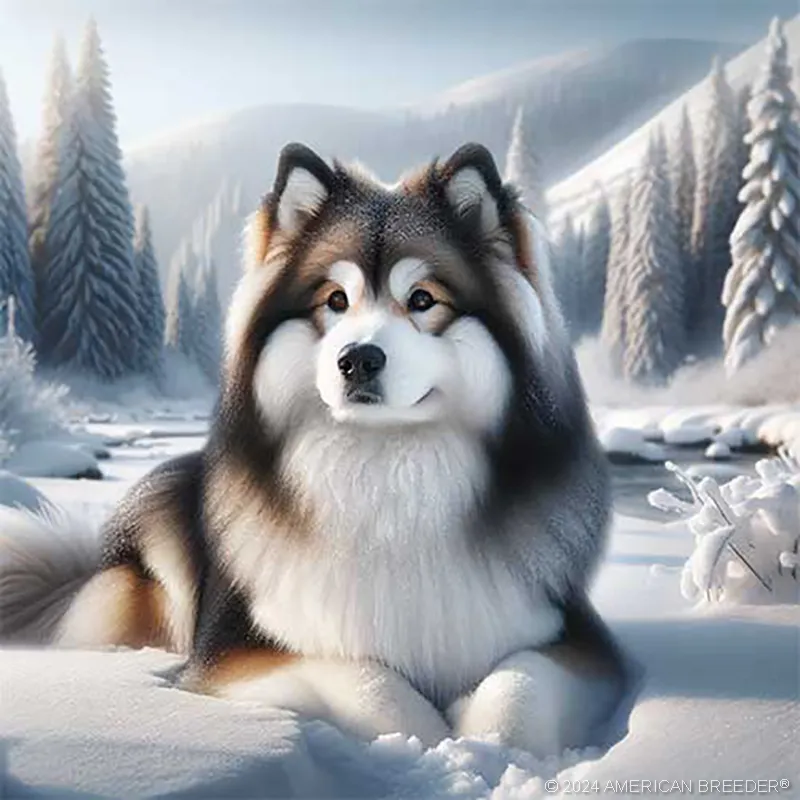 Breed Background: Origin: Yakutia, Siberia | Breed Purpose: Hunting, herding, companionship | AKC Class: Not recognized by AKC | Year Recognized by AKC: N/A
Breed Background: Origin: Yakutia, Siberia | Breed Purpose: Hunting, herding, companionship | AKC Class: Not recognized by AKC | Year Recognized by AKC: N/A
Appearance: Size: Medium | Weight: 40-55 pounds (18-25 kg) | Coat Type: Double coat, dense | Colors & Patterns: White, cream, gray, various browns | Distinctive Features: Mask-like facial markings
Temperament: Energy Level: Moderate to high | Loyalty: Very loyal | Friendliness to Pets: Moderate | Friendliness to Strangers: Cautious | Trainability: Moderately trainable | Playfulness: Playful | Frequent Barker: Not very vocal | Chase Instincts: Strong | Sense of Smell: Excellent | Drive to Hunt: High
Health & Care: Health Issues: Hip dysplasia, cataracts, allergies | Lifespan: 12-15 years | Grooming Difficulty: Moderate | Exercise Needs: High
Socialization: Interaction with Children: Good with early socialization | Interaction with Pets: May be reserved, socialization essential | Interaction with Strangers: Cautious, can be aloof | Elderly Compatibility: Depends on individual temperament | Ease of Training: Moderate
Suitable Living Arrangements: Apartment: Not ideal, requires space | House: Preferred | Rural Area: Well-suited | Yard Size Requirements: Medium to large yard recommended
Training & Obedience: Trainability: Moderate (3/5) | Intelligence: High (4/5) | Obedience: Moderate (3/5) | Problem-Solving: Moderate (3/5) | Easily Stimulated: Moderate (3/5) | Focus Level: Moderate (3/5) | Easily Distracted: Moderate (3/5)
Financial Planning: Typical Price Range: Moderate to High | Initial Expenses: Purchase cost, vaccinations, spaying/neutering | Ongoing Annual Expenses: Food, grooming, vet visits, and training
Breeding: Reproductive Maturity: Around 6-12 months | Litter Frequency: Typically once a year | Litter Size: 4-6 puppies | Stud Cost: Moderate to High | Breeding Challenges: Finding suitable mates, health screenings essential
Did You Enjoy this Article? Share it and Help Us Spread the Word!
If you found this article helpful, we'd appreciate it if you could share it with your friends or link to it from your website, blog, or group! You can also use the convenient social share tabs on the left side of the screen to instantly share this page to your social media feed. For more ways to support and promote the American Breeder Community, visit our Share & Promote Together page for social media posts and memes you can copy and share. Your support means the world to us!
Disclaimer: The information provided in this article is for general informational purposes only and does not constitute legal, medical, financial, or professional advice. While we strive for accuracy, we make no representations or warranties regarding the completeness, accuracy, reliability, or suitability of the information. Please consult with a professional before making decisions based on the content provided. American Breeder Inc. assumes no responsibility for any errors or omissions or for the results obtained from the use of this information.

